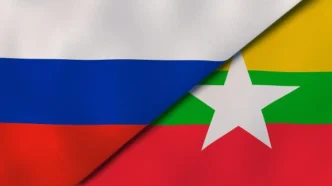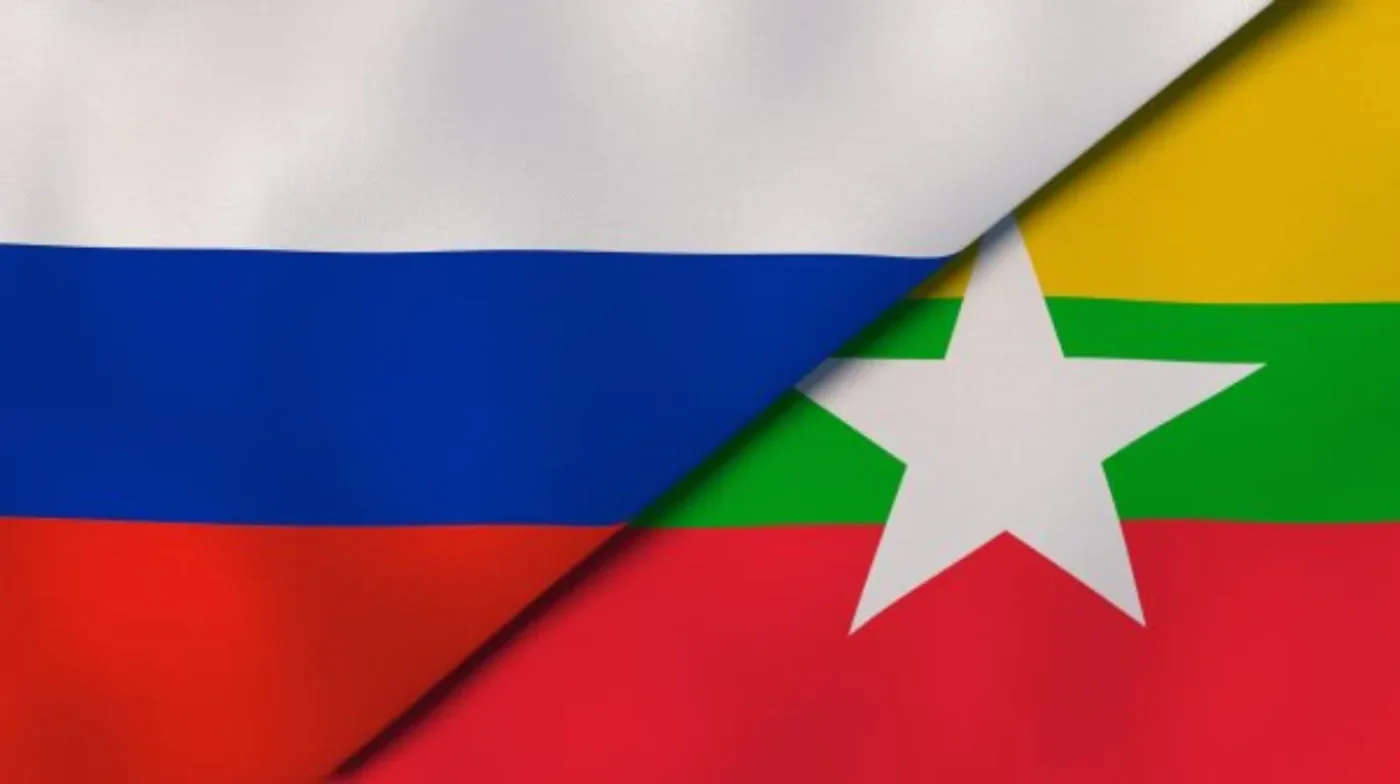In a significant step towards strengthening bilateral relations, Myanmar’s military chief, Senior General Min Aung Hlaing, met with Russian President Vladimir Putin at the Grand Kremlin Palace in Moscow on 4 March 2025. The meeting, marked by the symbolic gesture of Min Aung Hlaing presenting a book to Putin, culminated in the signing of multiple agreements, including plans for a small-scale nuclear power plant in Myanmar. This development signals a deepening of ties between the two nations, with implications for energy, trade, and regional security in the Asia-Pacific.
The agreements, which include a memorandum on constructing a 110-megawatt nuclear reactor using Russian technology, underscore Moscow’s growing influence in Myanmar amid the country’s ongoing internal challenges. With bilateral trade surging by 40% last year to approximately $2 billion, and commitments to further economic and cultural collaboration, the partnership is poised to reshape Myanmar’s industrial and geopolitical landscape.
A Nuclear Future for Myanmar
At the heart of the recent agreements is the plan to build a small-capacity nuclear power plant in Myanmar, equipped with a RITM-200 pressurized water reactor. President Putin, addressing the media alongside Min Aung Hlaing, emphasized that the project would address Myanmar’s electricity needs and support its economic development. “This will provide the necessary electricity for Myanmar’s economic growth,” Putin stated, highlighting additional benefits such as job creation and technical skill enhancement through related construction projects.
The nuclear agreement, accompanied by a memorandum on nuclear and radiation safety, marks a significant milestone in Myanmar-Russia cooperation. Discussions on such a project have been ongoing for years, with Russia positioning itself as a key partner in Myanmar’s energy sector. While the initiative promises to bolster Myanmar’s infrastructure, it also raises questions about safety, environmental impact, and the geopolitical ramifications of nuclear technology in a region marked by instability. If implemented, the project could enhance Myanmar’s energy security, though concerns about regulatory oversight and potential risks remain unaddressed in public statements.
Economic and Industrial Collaboration
Beyond the nuclear deal, the Moscow meeting solidified economic ties between the two nations. Putin noted the active role of the intergovernmental cooperation commission, with a recent trade commission meeting held in Naypyitaw, Myanmar’s capital. The leaders expressed readiness to expand mutual trade, building on last year’s substantial growth. Cooperation in loans and finance, alongside strategic energy sector partnerships, was also highlighted as a priority.
Industrial and high-tech projects form another pillar of this partnership. Russia has assisted in establishing a data analysis centre for satellite information in Myanmar, a move that could enhance the country’s technological capabilities. Additionally, agreements related to resource extraction, signed between Myanmar’s Natural Resources Ministry and the Russian fund RK-Investments, suggest an intent to deepen collaboration in Myanmar’s resource-rich sectors. While specifics remain limited, such deals could provide economic boosts, though their impact on local communities and the environment warrants scrutiny.
Cultural and Humanitarian Exchanges
The meeting also paved the way for cultural and humanitarian engagement, reflecting a broader scope of cooperation. Plans were announced to open a Russian cultural centre in Myanmar and to construct the first Russian Orthodox Christian church in Yangon, Myanmar’s largest city. In reciprocity, two centres for Myanmar culture and Buddhism already exist in Russia, as noted by Putin. These initiatives aim to foster mutual understanding and strengthen people-to-people ties, though their practical impact may be limited compared to the economic and strategic agreements.
An intergovernmental agreement on the recognition of diplomas and academic degrees was also signed, potentially facilitating educational exchanges. Such measures, while secondary to the headline-grabbing nuclear and trade deals, indicate a long-term vision for sustained collaboration across diverse fields.
Shared International Stances and Security Cooperation
On the international stage, Russia and Myanmar appear aligned on several issues, according to Putin. The Russian leader emphasized their joint efforts to promote peaceful development in the Asia-Pacific region, alongside active cooperation in the security sector. This alignment comes at a time when Myanmar’s military government, the State Administration Council (SAC), faces widespread criticism for its handling of internal conflict and human rights concerns following the 2021 coup.
Russia’s explicit support for “improving the internal situation in Myanmar” raises eyebrows, as it could be interpreted as an endorsement of the SAC’s policies. Moscow’s backing, particularly in industrial and economic sectors, offers a lifeline to the military regime amid international sanctions and isolation from Western nations. However, the full extent of security cooperation remains unclear, and any direct military support would likely draw further scrutiny given the ongoing violence in Myanmar.
Geopolitical Implications
The deepening Myanmar-Russia relationship must be viewed within a broader geopolitical context. Russia, seeking to expand its influence in Southeast Asia, finds a willing partner in Myanmar, which has been increasingly isolated since the military takeover. The nuclear project, in particular, may signal Moscow’s intent to counterbalance Western influence in the region, while providing Myanmar with critical infrastructure to support its faltering economy.
For Myanmar, aligning with Russia offers economic and technological benefits, but it risks further alienating Western governments and international organizations advocating for democratic reforms. If the nuclear plant project proceeds without adequate transparency or safety measures, it could also strain relations with neighbouring countries concerned about regional stability. While no evidence suggests immediate adverse outcomes, the speculative nature of such long-term projects necessitates cautious monitoring.
Trade and investment agreements, including those protecting and encouraging mutual investment, provide a framework for sustained economic engagement. Yet, the benefits may disproportionately favour elite interests unless mechanisms ensure equitable distribution. The potential for job creation and skill development, as mentioned by Putin, remains contingent on effective implementation and local capacity-building.
Regional and Domestic Reactions
While official statements from Moscow and Naypyitaw paint a picture of mutual benefit, domestic and regional reactions to the agreements are likely to vary. Within Myanmar, public sentiment—often expressed through social media platforms like X—may reflect scepticism about the military government’s priorities, especially given ongoing conflict and economic hardship. Russia’s involvement could be seen as propping up an unpopular regime, though access to electricity and jobs might temper criticism if tangible benefits materialize.
Neighbouring countries, particularly Thailand and Bangladesh, may view the nuclear project with concern, given the proximity and potential risks. The Asia-Pacific region, already a hotspot for geopolitical tensions, could see further complexity as Russia’s footprint grows. While Putin framed the collaboration as promoting peaceful development, the security dimension of the partnership may unsettle regional actors wary of militarization or instability.
A Path Forward with Uncertainties
The agreements signed during Min Aung Hlaing’s visit to Moscow represent a multifaceted partnership with far-reaching implications. From nuclear energy to cultural exchanges, Myanmar and Russia are charting a course of deepened cooperation that could reshape Myanmar’s domestic landscape and regional dynamics. The promise of economic growth, energy security, and technological advancement is tempered by uncertainties around safety, governance, and geopolitical fallout.
As these initiatives unfold, transparency will be key to addressing concerns about environmental and security risks associated with the nuclear project. The economic benefits, while significant on paper, must be evaluated against their impact on Myanmar’s beleaguered population. If confirmed, the trade and investment gains could provide a much-needed boost, though equitable distribution remains an open question.
For now, the Moscow meeting marks a pivotal moment in Myanmar-Russia relations, with both nations committing to a partnership that spans energy, economy, and security. Whether this alliance will deliver on its promises or exacerbate existing challenges remains to be seen, but its significance in the context of Southeast Asian geopolitics is undeniable.
















